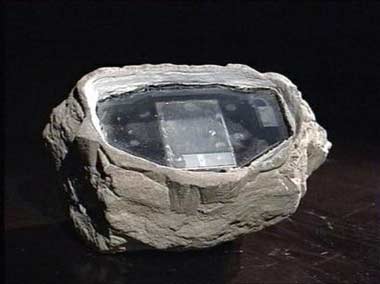|
Russians: British spied using fake rock
(AP)
Updated: 2006-01-24 14:03
Russia's main intelligence agency on Monday accused four
British diplomats of spying — using electronic equipment hidden inside a fake
rock in a park — as well as funneling funds to non-governmental organizations.

Electronic
equipment concealed in a rock, which was claimed to be used by four
British embassy staff members to receive intelligence information provided
by Russian agents, is seen in this image from television documentary shown
on Rossiya television on Sunday, Jan. 22, 2006. Russia's main intelligence
agency said Monday that it had uncovered spying activities by four British
diplomats. [AP] |
The announcement came a day after state television channel Rossiya broadcast
footage purportedly showing four British Embassy staff using electronic
equipment concealed in the rock in Moscow to receive intelligence from Russian
agents.
Sergei Ignatchenko, a spokesman for the Federal Security Service, the main
successor to the Soviet-era KGB, said the situation would be resolved "at a
political level," the RIA-Novosti news agency reported, an apparent indication
that the Russian government could expel the diplomats.
The intelligence agency also said a Russian citizen who allegedly had
contacts with British agents had been detained and confessed to espionage,
according to the Russian Interfax news agency.
Officials at the British Embassy in Moscow and Foreign Office in London
declined to comment on the espionage accusations. Prime Minister Tony Blair said
at a news conference that he had only heard about the allegations in media
reports and had no further comment.
Rossiya said the diplomats had downloaded information onto handheld computers
from the electronic gadget hidden in the rock, a process that worked at a
distance of up to 65 feet and took only one or two seconds.
Among the diplomats named in the television broadcast were Marc Doe and Paul
Crompton. Both are listed in British Embassy directories provided to the media
as working in the embassy's political section.
Interfax identified the two others as Andrew Fleming and Christopher Pirt,
but they weren't in the directories.
Rossiya also showed copies of documents allegedly showing that Britain had
transferred money to non-governmental organizations working in Russia, including
one that purportedly authorized a transfer of $41,000 in October 2004 to the
Moscow Helsinki Group, a leading rights group that has been a persistent critic
of Putin.
Interfax also reported that 12 NGOs had received funds under Doe's signature.
"This is the first time we literally caught them red-handed in the process of
contacting their agents here and received evidence that they finance a number of
non-governmental organizations," the ITAR-Tass news agency quoted Ignatchenko as
saying.
In a statement released following the Sunday broadcast, Britain's Foreign
Office rejected allegations of improper dealings with Russian NGOs, saying
London gave assistance openly to support the development of healthy civil
society in Russia.
But Gennady Gudkov, a retired security service officer and a member of the
security committee of the lower house of parliament, warned that foreign states
were using non-profit groups "for their own goals."
"I regret that British special services have discredited the very idea of
non-governmental organizations," he told AP.
In 1996, Russia and Britain engaged in a spying dispute launched by Moscow,
each expelling four diplomats.
Fyodor Lukyanov, editor of the magazine Russia in Global Affairs, predicted
the spy scandal would increase tensions between Moscow and the West as Russia
chairs the Group of Eight this year.
"This will provoke a very negative commentary in the
West. It will only worsen the picture since Russia already started its G8
presidency on a very inauspicious note," Lukyanov told AP, alluding to its
cutoff of gas to Ukraine over the New Year holiday, which resulted in brief
shortages for other European countries as well.
|